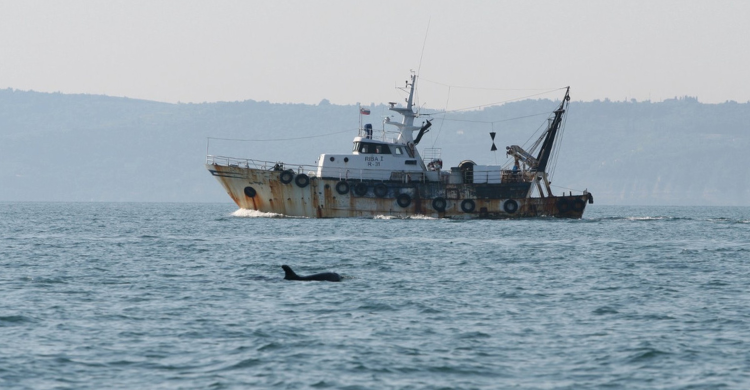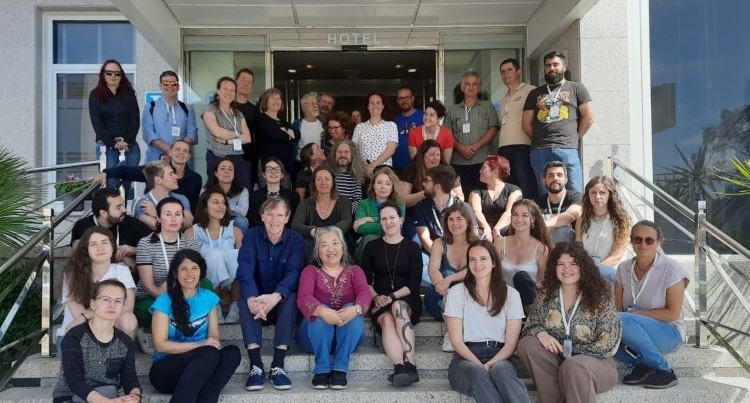Workshop on current cetacean bycatch issues in European waters

Photo © Tilen Genov, Morigenos
The Secretariats of ACCOBAMS and ASCOBANS co-organized an ECS Workshop on current cetacean bycatch issues in European waters, which took take place in O Grove, Galicia, Spain, on 17 April 2023, as part of the 34th Annual Conference of the European Cetacean Society. The objective was to share information, and to discuss how such bycatch can be mitigated.
The talk on the critically endangered Baltic Proper harbour porpoise noted that historically, harbour porpoise bycatch has been substantial in the region, both in the now-banned salmon driftnets, as well as in gillnets and trammel nets. It was likely that the semi-driftnets that are still used cause some bycatch. The ICES special request advice of 2020 to manage harbour porpoise bycatch in the Baltic Proper led to a delegated act under the EU Technical Measures regulation. This required closing static net fisheries in some important harbour porpoise areas, all year or part of the year, and mandating pingers to be used in static net fisheries in other areas. However, with the military navies of three countries vetoing large-scale pinger use, this measure has not been implemented, and the discussions in the Baltic regional fisheries body BALTFISH have yet to render alternative proposals of further effective bycatch mitigation measures.
A presentation on the bycatch of common dolphins in the Bay of Biscay in France highlighted the intensified strandings since 2016. Research has estimated bycatch levels of 4,000-10,000 per year, with nets having a particularly significant impact. While estimates of abundance do not show a decline, effects on demography have been detected: reduced longevity and age at first reproduction in females. A government-led working group was re-established and several technical devices were tested to reduce bycatch, but only pingers on pelagic trawls proved to be sufficiently effective and were made mandatory. Other devices are still in test phase. Strandings reached unprecedented levels in the winter of 2023. In March 2023, the French Council of State ordered France to take measures to reduce bycatches through fishing closures within 6 months.
A talk on the state of the Mediterranean and Black Sea fisheries noted that seabirds and cetaceans (9 829 individuals) were the two vulnerable species groups with the lowest numbers of reported interactions and individuals incidentally caught. Concerning cetaceans, the majority of data were reported from the Black Sea (9 159 individuals), where coastal fisheries targeting Black Sea turbot continue to have an impact on the cetacean population – which is composed of three endemic species:, Black Sea common dolphin (Delphinus delphis ponticus), Black Sea bottlenose dolphin (Tursiops truncatus ponticus) and the most impacted, Black Sea harbour porpoise (Phocoena phocoena relicta). Few data are reported from the other GFCM subregions. More systematic data collection and studies, following standard protocols, can contribute to better understanding the different types of impacts, filling knowledge gaps and indicating which types of fishing gear are most harmful and whether fishing patterns reveal any geographical or seasonal trends.
Further presentations included on-board cameras to monitor marine mammal bycatch - the OBSCAMe project on gillnetters in the Bay of Biscay; monitoring effectiveness of pingers in reducing cetaceans bycatch in Bulgarian bottom set gillnets; review of available data on cetacean bycatch in stranding databases from the ACCOBAMS area; bycatch of bottlenose dolphins in Slovenia and the Gulf of Trieste; testing deterrent devices to reduce depredation and bycatch in Southern Portuguese coastal fisheries; application of acoustic reflectors in gillnets to reduce bycatch of harbour porpoises and other odontocetes while keeping fish catches; fishery bycatch of cetaceans in the Iberian Peninsula and Bay of Biscay.
In addition, the European Commission DG MARE presented the EU Action Plan: Protecting and restoring marine ecosystems for sustainable and resilient fisheries; and ICES presented its roadmap for bycatch advice on protected, endangered and threatened species. The workshop concluded with a presentation from the Environmental Investigation Agency on implications to cetaceans from EU policy developments
The presentations and the workshop report will be made available on the workshop page in due course.

Workshop participants. © Arda Tonay
Last updated on 09 December 2023


